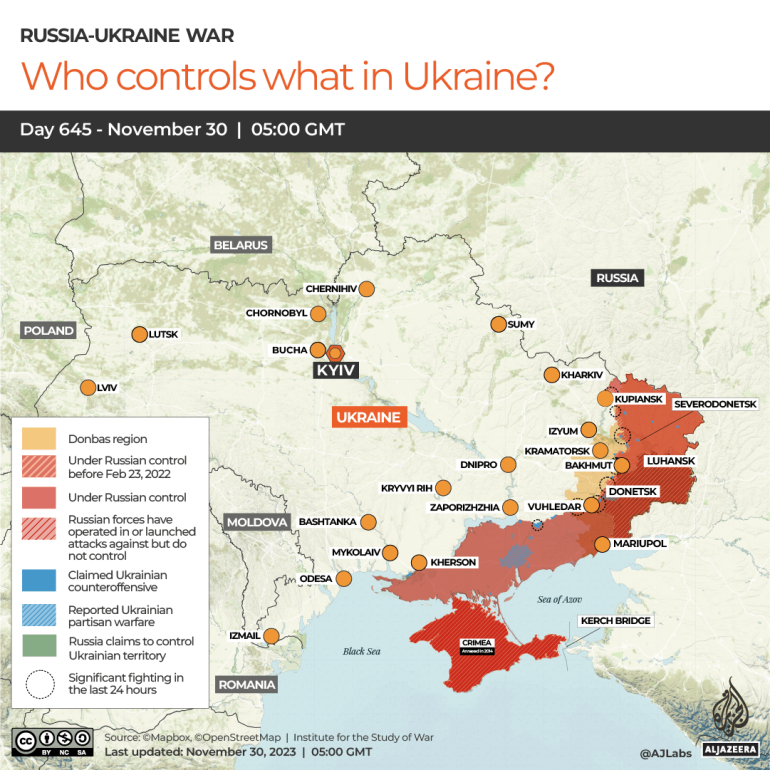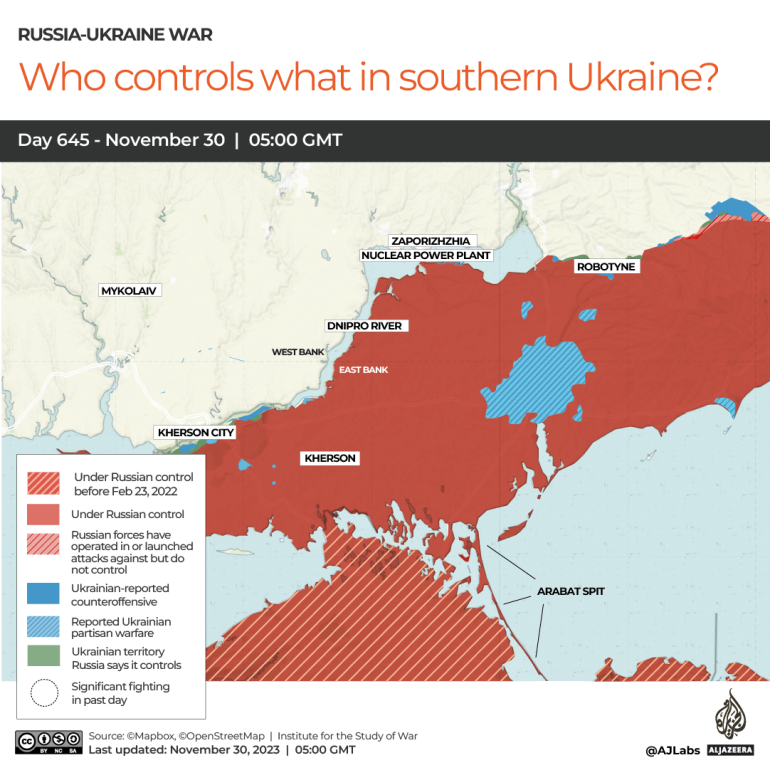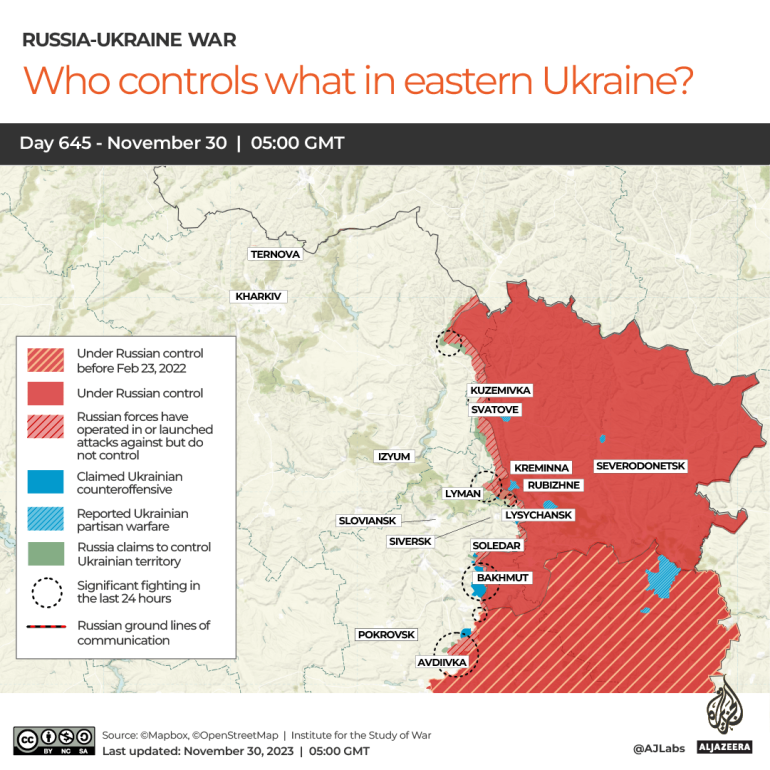This winter is likely to see a long and bloody stalemate in Ukraine, with neither side backing down from offensives and counteroffensives, but may sow the seed of negotiations next year, experts tell Al Jazeera.
“The winter is just going to reinforce the misery … neither side is going to have a tactical or operational breakthrough,” retired colonel Seth Krummrich, now vice president at Global Guardian, a security consultancy, told Al Jazeera.
Ukraine launched a major counteroffensive in early June that by some estimates took back half the land Russia had seized earlier in the year.
But it failed in its strategic objective of cutting Russian forces in two, isolating Kherson, Zaporizhia and Crimea from Luhansk, Donetsk and Kharkiv. Ukrainian senior commanders have said the counteroffensive will continue through the winter.
Last month Russia attempted to answer with a new set of offensives in the east – headed towards the cities of Kupiansk, Lyman, Avdiivka and Mariinka. None has succeeded, but Russia has continued the assaults despite snow and frost, as evidenced near Kupiansk on November 21.
“I think they’re going to try to push through in the winter,” said Krummrich. “The ground freezes, [they’ll] try to make some moves because they’re desperate. I don’t mean the Ukrainians. I mean the Russians. The soldiers won’t want to do it. It will be a disaster. There will be more dead bodies,” he said.
That is already evident. Ukraine’s armed forces estimate 6,260 Russian deaths in the week of November 20-26, an average of almost 1,000 a day – the result of relentless Russian attacks in the east.
“This is a war that lacks high strategy,” Konstantinos Grivas, who teaches weapons systems and geopolitics at the Hellenic Army Academy, told Al Jazeera.
“Russia became trapped in an attrition war, which has its own logic … it’s a war on autopilot.”

Both sides have failed to come up with a technological or tactical advantage that would produce a breakthrough because defence is dominant, said Grivas.
“Firepower and passive defences – minefields, trenches for instance – seem to have neutralised the capabilities of mechanised and airborne forces,” said Grivas. “If there is a critical development it will be a collapse due to exhaustion – like a boxing match where one fighter simply can’t take the blows, but not from a knock-out punch.”
Both sides have had strategies for success, but all have so far been parried.
Russia had hoped for a quick collapse of the Ukrainian armed forces when it invaded in February 2022. When that failed, it rained down some 10,000 missiles on Ukraine’s cities to break the country’s will to fight.
Last winter Russia targeted power stations, causing outages, and in July it started targeting port infrastructure to stop the export of Ukrainian grain.
Ukraine’s Western allies responded with air defence systems, spare parts and emergency generators to keep Ukraine’s power flowing. They provided medium-range missiles Ukraine combined with its domestically manufactured drones to drive Russian naval power back to its own shores, creating a safe passage for merchant shipping.
Ukraine tried its own offensive strategies. It used these ranged weapons to strike deep in the Russian rear to disrupt the supply of weapons to the front, but Russia moved its stockpiles out of range and found delivery byways. Ukraine has sent drones to attack Russian missile manufacturing sites and Moscow itself, but their payloads were too small to do much damage.

Ukraine has most recently asked for F-16 fighter planes, which some NATO members have agreed to supply, but it is doubtful these will be a stalemate-breaker either, say experts.
“Even if they get F-16s, they won’t be able to use them effectively because these planes need thousands of hours [of training] in flight to become operational,” Andreas Iliopoulos, a former deputy commander of the Hellenic Army, told Al Jazeera. “They won’t be effective until 2025.”
“I think all this is a Ukrainian effort to continue to claim Western help and stave off fatigue and the pressure to negotiate,” said Grivas.
Ukraine’s allies banned Russian oil, gold, diamonds, lumber and other lucrative exports to starve the Russian economy, but Russia sold its oil at discounted rates to China, India and other markets.
Sanctions also attempted to stop the flow of capital and sensitive technologies to Russia. But Russia has been manufacturing weapons and buying artillery shells and drones from pariah states that share its hatred of the United States – Iran and North Korea.
Last August, Ukrainian intelligence estimated Russia had about 585 missiles of various types left, but planned to build more than 100 a month. This month, the Ukrainian military said, Russia had stockpiled more than 800 missiles in Crimea alone and was preparing to fire them.
Time for negotiations?
Russia’s ability to keep up its stockpiles and to draw on large reserves of manpower has led some observers to suggest that time is on its side.
“Ukraine was likely to lose in a protracted war of attrition, because it would be an unfair fight,” wrote John Mearsheimer, a professor of political science at the University of Chicago, in a recent opinion piece entitled “Bound to Lose”.
“I keep hearing people say, he’s going to wear out the Ukrainians. That’s not going to happen with a conscript army that doesn’t want to be there,” said Krummrich, who has fought in special operations in Iraq and Afghanistan, and believes Russian soldier morale is breaking down.
“Every single wave of soldiers that somehow survives and goes home, they’re telling everybody they can, ‘for the love of God, do not get pulled out to Ukraine’,” said Krummrich.
Recent reports suggest a growing number of Russian soldiers want to go home.

While Ukrainian President Volodymyr Zelenskyy has forsworn any negotiations while Russia sits on Ukrainian soil, Russia has been more nuanced.
“Russia has never refused peace talks with Ukraine,” Russian President Vladimir Putin told the Group of 20 on November 21. “Of course, we should think about how to stop this tragedy.”
“I think he is messaging again, ‘Hey, I need a way out’. When he got involved in this … he did not have a plan for this situation,” Krummrich said.
“I think the secret desire of both is how to get out and who is going to negotiations first,” Grivas said.
But is it likely to happen this winter?
Both sides are demonstrating a will to fight, for now.
Putin may be looking for a symbolic victory ahead of an election next April, and other fissures in the Western alliance, say experts, particularly if former President Donald Trump seems likely to win the US presidential election.
“What’s going to happen to the American election … Trump and what the Republicans represent does not help Ukraine, and could potentially make things easier for Russia,” said Krummrich.
Congressional Republicans loyal to Trump have led an effort this year to staunch the flow of military aid to Ukraine, saying the US deficit is too high.
Even if Ukraine is eventually partitioned, some people believe Russia will suffer a greater loss.
“Russia is headed for a big defeat. Its victory would be a catastrophe, because it is being isolated from the rest of Europe, a big blow to its existential core,” said Grivas.
“It is being Asianised. The winner is China and the other Eurasian powers, who are able to instrumentalise Russia for the ends of their foreign policies,” he said.
Source : AlJazeera


